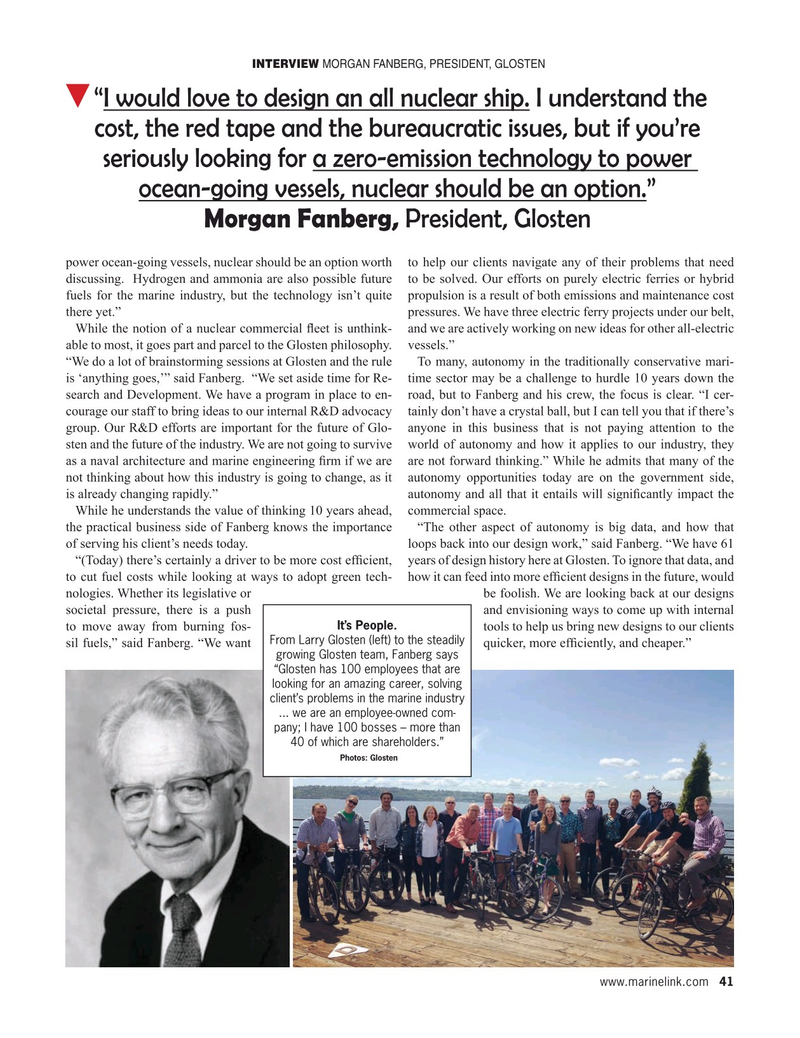
Page 41: of Maritime Reporter Magazine (January 2020)
Ship Repair & Conversion Annual
Read this page in Pdf, Flash or Html5 edition of January 2020 Maritime Reporter Magazine
INTERVIEW MORGAN FANBERG, PRESIDENT, GLOSTEN “I would love to design an all nuclear ship. I understand the cost, the red tape and the bureaucratic issues, but if you’re seriously looking for a zero-emission technology to power ocean-going vessels, nuclear should be an option.”
Morgan Fanberg, President, Glosten power ocean-going vessels, nuclear should be an option worth to help our clients navigate any of their problems that need discussing. Hydrogen and ammonia are also possible future to be solved. Our efforts on purely electric ferries or hybrid fuels for the marine industry, but the technology isn’t quite propulsion is a result of both emissions and maintenance cost there yet.” pressures. We have three electric ferry projects under our belt,
While the notion of a nuclear commercial ? eet is unthink- and we are actively working on new ideas for other all-electric able to most, it goes part and parcel to the Glosten philosophy. vessels.” “We do a lot of brainstorming sessions at Glosten and the rule To many, autonomy in the traditionally conservative mari- is ‘anything goes,’” said Fanberg. “We set aside time for Re- time sector may be a challenge to hurdle 10 years down the search and Development. We have a program in place to en- road, but to Fanberg and his crew, the focus is clear. “I cer- courage our staff to bring ideas to our internal R&D advocacy tainly don’t have a crystal ball, but I can tell you that if there’s group. Our R&D efforts are important for the future of Glo- anyone in this business that is not paying attention to the sten and the future of the industry. We are not going to survive world of autonomy and how it applies to our industry, they as a naval architecture and marine engineering ? rm if we are are not forward thinking.” While he admits that many of the not thinking about how this industry is going to change, as it autonomy opportunities today are on the government side, is already changing rapidly.” autonomy and all that it entails will signi? cantly impact the
While he understands the value of thinking 10 years ahead, commercial space. the practical business side of Fanberg knows the importance “The other aspect of autonomy is big data, and how that of serving his client’s needs today. loops back into our design work,” said Fanberg. “We have 61 “(Today) there’s certainly a driver to be more cost ef? cient, years of design history here at Glosten. To ignore that data, and to cut fuel costs while looking at ways to adopt green tech- how it can feed into more ef? cient designs in the future, would nologies. Whether its legislative or be foolish. We are looking back at our designs societal pressure, there is a push and envisioning ways to come up with internal
It’s People.
to move away from burning fos- tools to help us bring new designs to our clients
From Larry Glosten (left) to the steadily sil fuels,” said Fanberg. “We want quicker, more ef? ciently, and cheaper.” growing Glosten team, Fanberg says “Glosten has 100 employees that are looking for an amazing career, solving client’s problems in the marine industry ... we are an employee-owned com- pany; I have 100 bosses – more than 40 of which are shareholders.”
Photos: Glosten www.marinelink.com 41
MR #1 (34-49).indd 41 1/10/2020 2:17:10 PM

 40
40

 42
42
